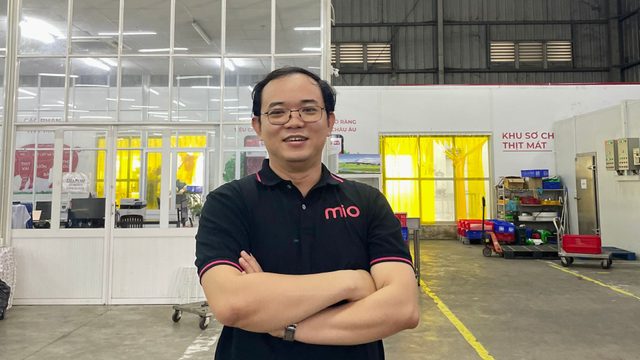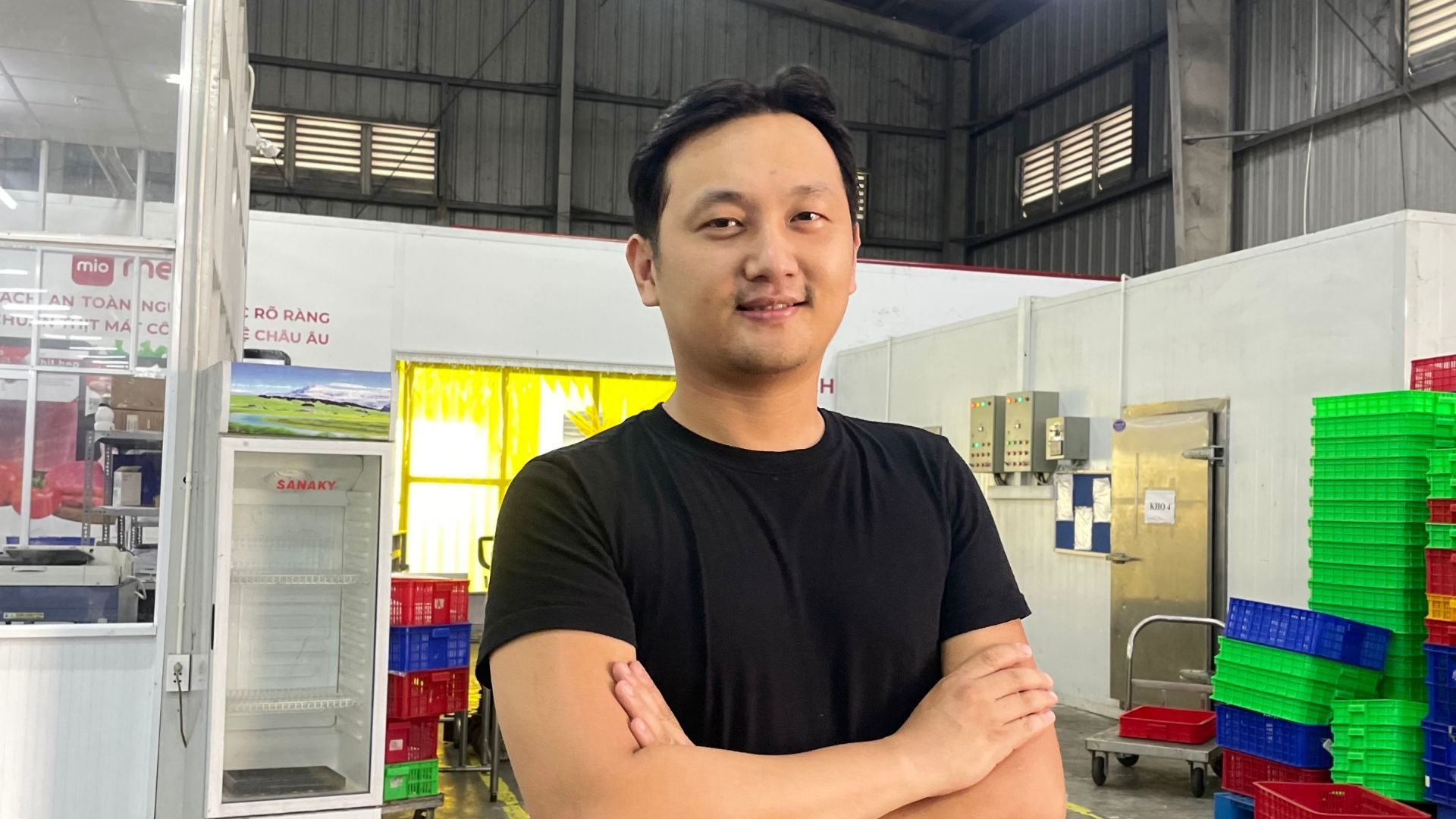Partner content in association with
Why social commerce platform Mio’s pivot to meat is a strategic move
Trung Huynh, Co-founder and CEO, Mio
Vietnam’s meat industry has experienced significant growth driven by changing consumer preferences, economic development, and increasing meat consumption. It is a vital component of the country’s food sector, encompassing the production, processing, distribution, and consumption of various meats, including pork, poultry, beef, and seafood. The industry plays a crucial role in meeting the dietary needs of the Vietnamese population and has witnessed consistent growth in recent years, driven by rising income levels and urbanisation. As of 2023, revenue in the meat market amounts to US$10 billion and the market is expected to grow annually by 10.03% (CAGR 2023-2028) according to Statista. Evidently, the meat industry in Vietnam offers significant growth opportunities to multiple players despite well-established giants such as CP Group and Vissan JSC.
To tap into this opportunity, social commerce network Mio has made a calculated pivot into the meat business. Mio has an interesting story, having started as a group buying platform specialising in selling fresh produce and groceries in Vietnam’s Tier 2 and 3 cities.
The story of Mio dates back to 2020, when co-founder and CEO Trung Huynh was inspired by his mother’s unusual shopping habit of calling for groceries from a trusted neighbour (rather than from a supermarket) who had been supplying to the entire neighbourhood at affordable prices. A business opportunity immediately struck Huynh and he quickly built a prototype to test its viability among groups consisting the likes of stay-at-home-moms and blue-collar workers, offering them a chance to join a network of agents who could earn extra cash by signing on to the platform to resell products. The responses were immediate and tremendous resulting in the establishment of social commerce platform Mio.
How the journey began
With rising internet penetration and investors remaining bullish on the social commerce model, Mio showed great promise of growth and was touted to be the next driver of advancement for Tier 2 & 3 towns in the region, dashing ahead of traditional commerce models. In May 2021, Mio raised $1 million in seed funding co-led by Venturra Discovery and Golden Gate Ventures. Other participants included iSeed SEA, Gokul Rajaram, Vidit Aatrey and Sanjeev Barnwal, co-founders of Indian social commerce unicorn Meesho. In January 2022, they raised $8 million in a Series A funding round led by Jungle Ventures, with participation from Patamar Capital, and angel investor, Oliver Jung. Existing investors too joined this round of funding.
Challenges in the social commerce model
Social commerce, or the practice of leveraging social capital has been a rage across the world since the rise of social media and was further heavily accelerated due to the outbreak of COVID and the subsequent lockdowns. Vietnam’s social commerce model has been reshaping the retail landscape, offering new opportunities for businesses and transforming consumer behaviour. The sector’s growth potential has remained robust. However, it faces challenges, including regulatory considerations and logistical hurdles. After running operations successfully for two years, Mio found itself running into those very challenges.
While the company continued to operate well on a small scale after the pre-seed and seed rounds when they could easily verify customer behaviour and ensure the quantity of goods and logistics, problems started to surface when faced with pressure to scale and expand to other cities. This was coupled with the change in post-pandemic behaviour when customers started returning to supermarkets thereby diluting the role of agents appointed by Mio.
Speaking to DealStreetAsia, CEO Huynh said, “To scale the model you need to look deeply at the unit economics and how they will play out in the long term. When you expand to all the centralized cities you need to make sure that you’ve got all of the pieces functioning properly including logistics, warehousing, sales, and marketing. Most importantly, you need to make sure that the unit economics of the model is sound for each city that you operate in. That’s when we saw a very dramatic increase in the operational costs and realized that if we continue with the current strategy then we would need to have a very strong source of subsequent funding rounds to quickly scale to all the cities.”
To add to this challenge, Huynh said, “2022 was a tough year for the capital market. The amount of capital Mio would require to scale was not about to come through in a downturn as a result of the global economic turbulence.” The team quickly realized that they had to make a decision on whether to continue on this path to keep up the growth or find an effective pivot. They then decided that they would treat social commerce as just one of the channels and explore other distribution channels that are more profitable and which would yield them better unit economics.
Secondly, they decided to rethink their offerings. Where Mio originally offered fresh products, like vegetables, fruits, Fast Moving Consumer Goods and meat they decided to do away with the products that were not giving them a favourable gross margin and focus firmly on the categories that would earn them a good retention and good margin. The one offering that was consistently earning them a good margin and had stable demand was meat.
Idea behind the pivot
Speaking about the decision to pivot to meat, Huynh said, “We decided to consolidate our portfolio and stay more focused on meat to trump competition. The social commerce market had reached a point of saturation because a lot of competitors were offering a range of products including cosmetics and also offering agents higher margins and higher commission. We believed that the agent model or the B2B2C, had became saturated at the time so we decided to no longer depend on that channel. Instead, we opted for the B2B mode in 2023, while reworking our B2C model for reintroduction in 2024, and aimed to build a strategy for the two models to work in harmony and complement each other.
How the pivot will help Mio scale
Huynh is of the opinion that when starting fresh, from the operational perspective it’s always less challenging if you manage one category or one product line versus multiple product lines. If you manage too many categories, each category would have to be managed differently so you would need a vast procurement capability. However, with the focus on only meat, which is a huge market in Vietnam, operations become a lot easier.
Secondly, moving away from the agent model of social commerce, which was only focused on uplifting housewives, stay-at-home-moms and blue-collar agents, they discovered that a lot of retailers and traders were enthused to join Mio’s meat business platform. So the inconsistency of working with individuals as agents who were hard to retain was replaced by the stability of the B2B model which made retention easier. Subsequently, this will make expanding to other cities easier and help to reduce operational costs and hurdles.
What gives Mio the edge in the meat business
Vietnam’s US$10 billion strong meat industry is highly competitive housing big brands like Vissan JSC, Masan MEATLife, Saigon Food Corporation, and more. So the question arises, what gives Mio a competitive advantage?
Addressing this very pertinent question, Mio General Manager Phuc Nguyen says they are not limited by the company’s own farm sources as in the case of some big players. “We can source meat, mainly pork which we are very well-informed about, from farmers across the feed industry. Our greatest advantage is the market knowledge we possess backed by a strong network of resources and experiences. Unlike big players like Masan and Greenfeed, we don’t need to spend several years and several trillions to learn the market as we are already well-versed and our model allows us greater flexibility. Most importantly, we have a cutting-edge internal multi-channel ERP software system which is an online revenue analysis and reporting software. It is powerful and compact and makes transactions seamless and effective,” he said.
The Mio app also facilitates multi-channel sales. It is easy to transfer and connect to other ecosystems. The platform is backed by intelligent and infallible software which simplifies collection of big data in the fast-moving consumer goods industry providing Mio with the unique advantage.

How will the pivot affect logistics and staffing?
Both CEO Huynh and GM Nguyen maintain that the pivot to the meat business does not greatly affect the logistics and operational process. As they have an inventory model the role of warehouses becomes crucial because meat/ pork has a short shelf life. The process of procuring, processing, packaging, labelling and inspecting is carried out over a few hours and the inventory is sold almost immediately. When the business expands, the current warehouses will be utilised as factories and the company will establish smaller hubs to serve customers. Eventually Mio seeks to start selling their own branded products; therefore, how the warehouses are managed becomes critical to the business.
“We are moving to an omnichannel model to improve gross margin and stay in the game. To get us started, we initially cooperated with large corporate farms to procure and provide ample quality supply. During this time we also cooperated with banks to create preferential capital for small and medium-sized farms to help them raise livestock. Progressively, we will help them to grow quality supplies at competitive prices”, the GM said.
Expansion plans
Currently Mio is focused on growing strong in one city (Ho Chi Minh). Expanding to other cities, while being a strategic move, would not be a priority now. However, their focus is to expand to more meat products within the category to offer a wide range of white labels to the same group of customers in a certain region.
In terms of expansion what customers and investors can expect is more innovation. “Once we establish the right product mix and a range of branded products, then we will have more confidence to expand to other cities. At the moment our priority is to attract, secure and retain more customers with exciting products to grow profitable”, says Huynh.
Challenges and opportunities and how Mio will tackle them
Having started off as a successful social commerce business which raised $9 million in 3 years, Mio now faces the challenge of convincing investors about the new model. But the founders are confident that they can overcome this given the strength of their software. Eventually, Mio is a technology rich platform which will work on collecting big data, organising and establishing an effective food model, much in the same way as Grab initially established a successful transport model owing to its state of the art technology.
The founders are confident that they will deliver a lucrative business to investors.
“While breaking-even might take a considerable amount of time, Mio’s primary aim is to promote its technology in the industry. The big advantage investors will have is that at the end of five years of investing, they will have in their hands a company worth billions of dollars. Meat is hard, therefore it’s good”, adds Huynh.


